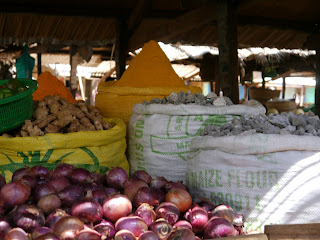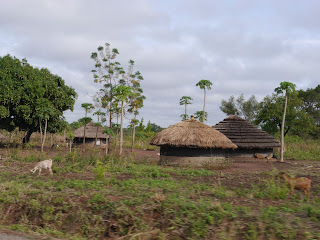 |
| A Gulu hotel's beautifully manicured perfection... |
This is the first trip where I have been working alongside an internal organization and an international one. The partnership is good, the connections get us to a hotel, the driver knows his way around mostly, and we see much of Gulu passing by in a car. Not my usual.
 |
| A Gulu street- not bad, but not the smoothest ride! |
Gulu is bustling and in many ways like Kampala in its friendliness and constant traffic, bodas (motorcycles) cutting people off, and NGO signs all over, but then it ends. Within 5 or so blocks, you are back facing "the villages." Unlike Rwanda, grass huts have not be wiped of the face of the country. Gulu has a Uchumi grocery store with everything a muzungu could want, but its size comes out with the fact that it only has one Forex Bureau.
 |
| Gulu's temporary marketplace |
Gulu's new market place should be open 'soon', one that will ideally keep out the sun, the rain, and whatever other weather might be tossed Gulu's way. The building of the new market of course leads to a temporary market of haphazard yet orderly rows of structures that are full of the usual suspects from plastic bins, plates, and jerrycans to the most colorful of fruits and vegetables. Passion fruit, pineapple, papaya, water melons, tomatoes, pumpkins, potatoes, plantains, and onions- you name it, it is there! The colors are astounding and the smells distinctive. The chickens and fish can be smelled before they are seen, and driving up to the market it just took opening the car door to let the smells in. The ginger and spices and the sounds of people going about their business on the warm Sunday afternoon was refreshing from the clean white slippery tiles of our hotel.
 |
| Ceremonial bells were particularly prevalent at the market. |
It was nice to be in Gulu- for real rather than for expats. The market sold Batwa pottery as well as knives and canes and ceremonial bells. I have get to see their usage, but my focus this trip has been on educational culture rather than that of tribes and ceremonies. The facets of culture that have come into this study of education indeed includes religion, tribes and gendered expectations, but it also speaks to a predominantly agrarian. As with most rural areas digging (or farming) is quite
common and it is fare more rare to have any other type of profession- even with
the massive influx of NGOs that the post-conflict peace has allowed to grow.
 |
| Cow salt rocks or onions? |

Invisible Children made a name for Joseph Kony outside of
Uganda by showing videos of abducted children, torturous enslavement and brutal
murders. It is a quiet town now, where men play cards at the market and are
back to worrying more about feeding themselves or which NGO can help them most
than worried about gun shots down the road. It has quite a tragic past, and I
definitely recommend reading up on it, but also stress the importance of not
over victimizing those that have remained. They are survivors. In much the way
that any other civilians feel during a time of war, these people lived
wondering “will I be here tomorrow” and are now proud to have survived.
The is so much talk of suffering here in Uganda, of poverty, of disease, of injustice, but there is so much laughter. Laughter at the market between ladies selling tomatoes, laughter of children, men laughing over a game of cards, and laughter as the lights go out yet again when the power goes out. This is not to say that life is not hard, that there isn't child labor or serious issues with domestic violence, but there is something else that brings out the laughter.
I believe that this is hope, and the belief that life goes on- if not for you, then for the next person. If for you, then it can get better. Hard work and taking risks works out for some people, and if you are well-educated, you will know the risks work taking and those to avoid. The schools we have seen aren't perfect. Most second graders probably still can't write their letters properly or copy them from another version on the board above them, but they are there and trying.
Valuing education is not automatic. It can be taught and has little to do with patience. The people of Uganda are patient. So much more patient than the average American. We have different standards of course, but subsistence farming demands patience, as does reconciliation, saving money you have in you possession rather than the bank and not lashing out when what should happen doesn't. In some ways this allows for much of the corruption and transparency in the country, because people don't fight it, but also allows for growth and progress if the right people are in charge.
It is of course hard to know how or when that will be, but the teachers that are doing such good work give me hope for the next generation of Ugandans. I've heard a lot about social justice and giving women chances. It's been visible in some of the schools we've visited with their female head teachers (or principals), and will continue to blossom, but I will get to that in my next post!





 Invisible Children made a name for Joseph Kony outside of
Uganda by showing videos of abducted children, torturous enslavement and brutal
murders. It is a quiet town now, where men play cards at the market and are
back to worrying more about feeding themselves or which NGO can help them most
than worried about gun shots down the road. It has quite a tragic past, and I
definitely recommend reading up on it, but also stress the importance of not
over victimizing those that have remained. They are survivors. In much the way
that any other civilians feel during a time of war, these people lived
wondering “will I be here tomorrow” and are now proud to have survived.
Invisible Children made a name for Joseph Kony outside of
Uganda by showing videos of abducted children, torturous enslavement and brutal
murders. It is a quiet town now, where men play cards at the market and are
back to worrying more about feeding themselves or which NGO can help them most
than worried about gun shots down the road. It has quite a tragic past, and I
definitely recommend reading up on it, but also stress the importance of not
over victimizing those that have remained. They are survivors. In much the way
that any other civilians feel during a time of war, these people lived
wondering “will I be here tomorrow” and are now proud to have survived.
No comments:
Post a Comment